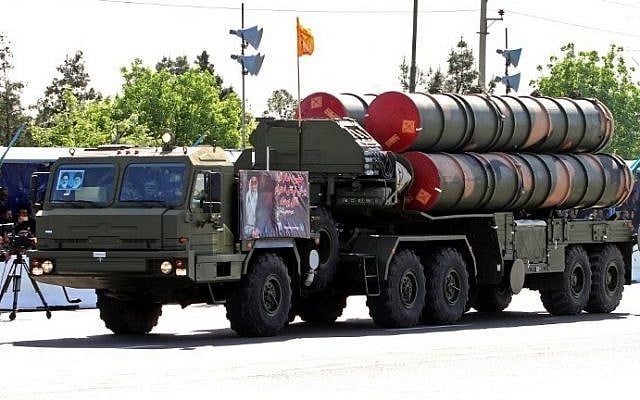Iran upgrades air defense in response to emerging threats: Commander
The commander of Iran's northeast air defense zone reaffirms that Iran's military advancements are solely for deterrence purposes and do not pose a threat to neighboring countries.
-

An Iranian military truck carries parts of the S-300 air defense missile system during a parade on the occasion of the country's Army Day, on April 18, 2017, in Tehran. (AFP)
The commander of Iran's northeast air defense zone, Brigadier General Mohammadreza Masoumi, stated, on Sunday, that Iran has updated its air defense systems in response to new threats.
Masoumi emphasized that Iran's air defense capabilities can now detect and address any potential threats effectively.
The Iranian Brigadier General highlighted that as aerospace threats evolve, Iran is ensuring that its defensive systems are advancing at a similar pace.
Additionally, he reiterated that Iran's military advancements are solely for deterrence purposes and do not pose a threat to neighboring countries.
This comes as US Defense Secretary Lloyd Austin announced in October that the United States will deploy a Terminal High Altitude Area Defense (THAAD) anti-ballistic missile defense system, as well as additional Patriot battalions in the Middle East.
The Gerald R. Ford Carrier Strike Group aircraft carrier is making its way into the Mediterranean to support the Israeli aggression on #Gaza. pic.twitter.com/o7dvP61neW
— Al Mayadeen English (@MayadeenEnglish) October 10, 2023
In addition, the USS Dwight D. Eisenhower Carrier Strike Group will be moved to the Central Command area of responsibility to join the USS Gerald R. Ford Carrier Strike Group, which is currently operating in the Eastern Mediterranean Sea, the statement read.
It is worth noting that Israel is currently committing genocide against the Palestinian people, killing over 11,000, including at least 4,609 children.
Read next: Elon Musk mocks US accusations of Iran being a 'warmonger'
Iran possesses missiles designed to target 'Israel'
The spokesperson for Iran's Defense Ministry, Brigadier General Reza Talaee Nik, announced in late September that Iran had developed missiles specifically designed for targeting the Palestinian territories occupied by "Israel".
At the time, he emphasized, "Today, we possess missiles known as 'Israel-hitting missiles,' as their primary purpose is to target the occupied territories."
General Talaee Nik explained that these missiles were developed by Iranian experts in response to existing threats and are named after the late General Qassem Soleimani. They are referred to as "Israeli-hitting missiles."
Providing further details, he described the missile as being 11 meters in length, weighing approximately 7 tons, and carrying a 500 kg warhead. These missiles have a top speed of Mach 12 and a ground impact speed of Mach 5.
General Talaee Nik also mentioned that the missile has a range of 1400 km, with the potential to extend it to approximately 1700 to 1800 km.
In the same context, Iran's Islamic Revolution Guard Corps (IRGC) Deputy Commander for Operations, Brigadier General Abbas Nilforooshan, revealed the plans for the new domestic hypersonic missiles that will impose "heavy costs" on the Israeli occupation.
Nilforooshan told the Iranian news agency Tasnim in early September that Iran has limited the range of its missiles to 2,000 kilometers by the orders of Iranian leader Sayyed Ali Khamenei, based on the country's operational doctrines and in light of enemy threats.
He did, however, point out that Iran would improve the range of its missiles if necessary, adding that his country is currently in the process of boosting the quality and capabilities of its missiles with a range of 2,000 kilometers.
Read next: Iran's Fattah missile is strong message to 'Israel': Israeli media
Referring to the Fattah hypersonic missile, which was presented in June, Nilforooshan explained that the missile that can move at a speed of Mach 14 to 15 has been dedicated to beat the Israeli occupation's anti-missile systems that Iran has full knowledge about.
The Brigadier General made it clear that Fattah and Iran's other new hypersonic missiles in development would impose significant damage on "Israel", pointing out that the time has come for the Israeli occupation's anti-missile systems to retire, as per Tasnim.

 4 Min Read
4 Min Read








